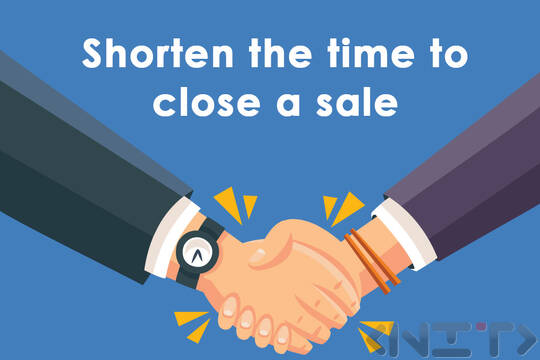
In sales, time is money. The faster you can close a deal or identify those who will not receive anything, the more money you will earn.
Everyone is looking for big deals, but this is only part of the trader's job. The speed of sales - how many deals you will make in a month, quarter or year - is very important. Traders can influence the number of transactions more than their size, because he manages his work process.
Here are 9 ways to reduce your closing time today:
1. Don't fall in love
When searching for potential customers, look for reasons why they would not be on your customer list. The reason is the psychological phenomenon known as "addiction to affirmation". When we make an initial assessment of a potential customer - "This person may buy" - our brain begins to look for evidence in favor of this statement and ignores those who contradict it. The result is unrealistic expectations, often more promising than reality.
You're wasting your time and resources on a customer who won't bring you anything, and you're starting to doubt your ability to detect alerts - "How come I haven't seen this before?"
Research shows that counteracting the "bias of confirmation" is simple - try to refute your initial opinion. Ask yourself, "What are the reasons this customer didn't buy from me?" and then find a solution.
2. Update your list
Sales specialists love long lists of potential customers, this is a guarantee of security, but be careful not to get lost in it. If your list of names is long and full of small buyers, you are likely to waste valuable time that you can focus on those that will bring you more profit. An analysis of traders in a large company shows that those whose lists of potential customers are shorter (30% fewer opportunities) make more money (50% more sales).
3. Take advantage of the recommendations
The recommendations accelerate the sales cycle in two ways:
- You connect faster with potential customers and
- Transactions with recommended customers close much faster.
However, many retailers see referrals as a good idea, but do not seek connections from their existing customers for potential ones. If you want more sales in less time, do not be ashamed, but ask to be recommended.
4. Make a "shopping list"
In a typical 6-month sales cycle, how long do you actually work on sales? If it's more difficult, maybe 50 or 60 hours - talk to the potential customer, identify his needs, present a solution and finally close the sale. The remaining 900+ hours are mostly waiting - waiting for the potential customer to return your call, waiting for information you need for the offer, waiting for the customer to present the offer to the right people, waiting for their reviews and comments ...
You can reduce your waiting time by making a "shopping list" - a checklist of all the information you will need to close the sale. Check as many points as you can from this list as soon as possible so that you don't run out of budget at the last minute or your proposal doesn't meet an important requirement that someone forgot to mention.
5. Ask the uncomfortable questions
Sales specialists worry too much about building a relationship from the beginning of their acquaintance with the client. That's why they are afraid to ask uncomfortable questions. "The potential customer will be affected if I ask this," they say to themselves. Non-professionals may be offended, but there are no real buyers. They are busy and don't want you to shoot in different directions, so ask boldly, "Do you think your boss would sign the deal if it was presented that way?" If the problem you described is really important, what is the obstacle to solving it? Assuming you want to make a deal, how will you ensure its budgeting?
6. "Take the order"
Studies show that most salesmen do not actually "take the order". "Taking the order" means engaging your prospect with the next step. The time for concluding a deal is extended when traders fail to determine their next move in the mind of the buyer. "Let's talk next month." says the client. "Okay, until then." says the average salesman.
"Let's make a note of it on the calendar." says the successful trader. "Besides this, what will be our goals? And can we fulfill them earlier?"
7. END of pointless calls
Sales people who call their customers every month to "check how they are" lose not only their time, but also that of their customers. On one hand, this means another lost month without any progress and sales results, and on the other hand, he seems lazy in the eyes of his potential customers. Each call should aim at one of two things: (1) progress toward closing the deal or (2) rejecting a potential customer.
8. Find four problems
When we identify a client's problem, the feeling that we are making progress quickly comes. One problem, however, means only one possibility to close the deal. Research shows that sales specialists who find more problems in the sales process are more likely to successfully complete this sale. The magic number, according to the same study, is four - less means missed opportunities, and if you look for more than four, you will lose focus.
9. Close the deal in the morning
Studies show that people are much more likely to say yes when they are well rested and have high energy levels. The more tired we feel, the more we tend to take the path of least resistance - which means sticking to the status quo. In the context of sales, this means rejecting the offer or refusing to make a decision. If you want your client to take action, contact them in the morning while they are still fresh and close the deal.



